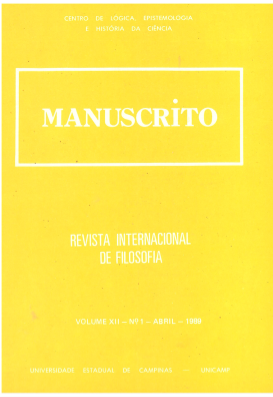Abstract
Grice's theory of conversation is designed for a kind of talk whose purpose is a maximally effective exchange of information. This specification is too narrow, if other kinds of talk are analyzed. As Grice himself has pointed out, his theory therefore needs to be generalized. This essay attempts to show how this could be done. Making use of concepts Searle has developed within his version of speech act theory, I call the conversational maxims established by Grice 'assertive', and I argue that there are directive, commissive, expressive, and declarative maxims of conversation too. A pattern for generalization thus clearly emerge. Though the main value of Grice's theory lies in allowing for (a reconstruction of) interpretations of utterances, there still remains a whole set of utterances whose meaning this theory has not yet been able to grasp. Mentioning a few examples of such utterances, I try to show how their meaning(s) can be reconstructed, if conversational maxims other than Grice's are recognized. That the explanatory potential of Grice's theory can be raised by incorporating further maxims should be illustrated in this way.
References
Dascal, M. (1979), Conversational relevance. In: Margalit, A. (ed.), Meaning Encounter, April 1976 (Synthese Language Library 3). Dordrecht: Reidel, pp. 153-174.
Dascal, M. (1985), The Relevance of Misunderstanding. In: Dascal, M. (ed.), Dialogue: An Interdisciplinary Approach (Pragmatics & Beyond Companion Series 1). Amsterdam: John Benjamins, pp. 441-459.
Goldman, A.I. (1970), A Theory of Human Action, Princeton: Princeton University Press.
Grice, H.P. (1975), Logic and Conversation. In: Cole, P. and Morgan, J.
(eds.), Syntax and Semantics, Vol. 3. New York: Academic Press, pp. 41-58.
Groeben, N. and Scheele, B. (1983), Produktion und Rezeption von Ironie.
Pragmalinguistische Beschreibung und psycholinguistische Erklärungs hypothesen (Tübinger Beiträge zur Linguistik 263). Tübingen: Narr.
Kempson, R.M. (1975), Presupposition and the Delimitation of Semantics
(Cambridge Studies in Linguistics 15). Cambridge: Cambridge University Press.
Levinson, S.C. (1983), Pragmatics (Cambridge Textbooks in Linguistics). Cambridge: Cambridge University Press.
Martinich, A.P. (1984), Communication and Reference Foundations of Communication). Berlin: de Gruyter.
Rehbein, J. (1977), Komplexes Handeln. Elemente zur Handlungstheorie der Sprache. Stuttgart: Metzler.
Schütz, A. (1971), Das Problem der Relevanz. Frankfurt: Suhrkamp.
Searle, J.R. (1969), Speech Acts: An Essay in the Philosophy of Language. Cambridge: Cambridge University Press.
Searle, J. R. and Vanderveken, D. (1985), Foundations of Illocutionary Logic. Cambridge: Cambridge University Press.
Vanderveken, D. (1985), What Is An Ilocutionary Force? In: Dascal, M. (ed.), Dialogue. An Interdisciplinary Approach (Pragmatics & Beyond Companion Series 1). Amsterdam: John Benjamins, pp. 181-204.
Wilson, D. and Sperber, D. (1986), On Defining Relevance. In: Grandy, R. and Warner, R. (1986) (eds.), Philosophical Grounds of Rationality. Intentions, Categories, Ends. Oxford: Clarendon Press, pp.243-258.

This work is licensed under a Creative Commons Attribution 4.0 International License.
Copyright (c) 1989 https://creativecommons.org/licenses/by/4.0/

